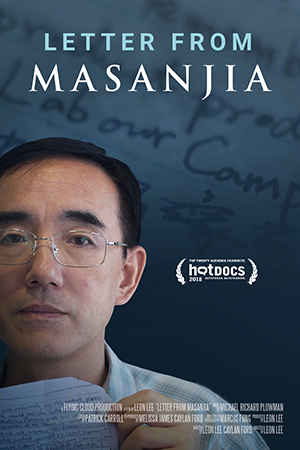Letter From Masanjia
Synopsis
Leon Lee’s extraordinary documentary Letter From Masanjia uncovers the often-neglected connections between political persecution in authoritarian countries and the international division of labor that has sustained Western consumer culture. The film begins in Damascus, Oregon, where Julie Keith, a mother of three young children, explains how, in 2012, she found an SOS note in a cheap plastic Halloween decoration purchased at K-Mart and left unopened for two years. The letter, she soon learned, was written by a Chinese prisoner at the Masanjia Labor Camp in the northeast province of Liaoning and urges its receiver to contact human rights organizations to report the many abuses and acts of torture that he and thousands of other inmates in his camp witnessed. Moved by this desperate call for help, Julie attempts to bring the unknown prisoner’s plight to the world’s attention and achieves that goal when her story, printed in a local newspaper, goes viral. Shifting to the perspective of Sun Yi, who wrote twenty letters (including the one discovered by Julie) and hid them in retail merchandise packaging in hopes of seeking justice, Lee’s film becomes a powerful reminder that most meaningful changes in life stem from the courage of a few individuals who fearlessly confront social ills for the sake of their fellow human beings. Letter from Masanjia explains how Sun was imprisoned in the titular labor camp for practicing Falun Gong, a popular meditation exercise which became outlawed by the Communist Party in 1999 as the movement was attracting millions of followers. With instructional help provided by the Chinese Canadian filmmaker, the former prisoner records secret footage of the facilities from a distance as well as painful testimonies in which he reflects on his two-and-half year confinement (between 2008 and 2010). During post-production, Lee decided to add minimalist black-and-white animation as a way to fill in the gaps of Sun’s horror story, which has been corroborated by two former guards from Masanjia who express their admiration for his resilience and exhibit remorse for the unspeakable violence that had been inflicted on him. More uplifting moments occur near the end of Letter from Masanjia, which eventually brings together Julie and Sun, who meet for the first time in Jakarta (where the latter took refuge in order to escape further persecution from Chinese authorities). To Sun’s disbelief, the American woman tells him that he has changed her life. As the end credits roll, that’s precisely what the audience has been made to feel about their own lives thanks to this important film.
Written by David Scott Diffrient

Filmmakers
Leon Lee
(2018)
China / USA
115 min
In English and Mandarin
Screenings
Friday, April 12
The Lyric
7:30 p.m.
Film Guest
Director Leon Lee will be in attendance for a post-screening
Q&A moderated by Hye Seung Chung.